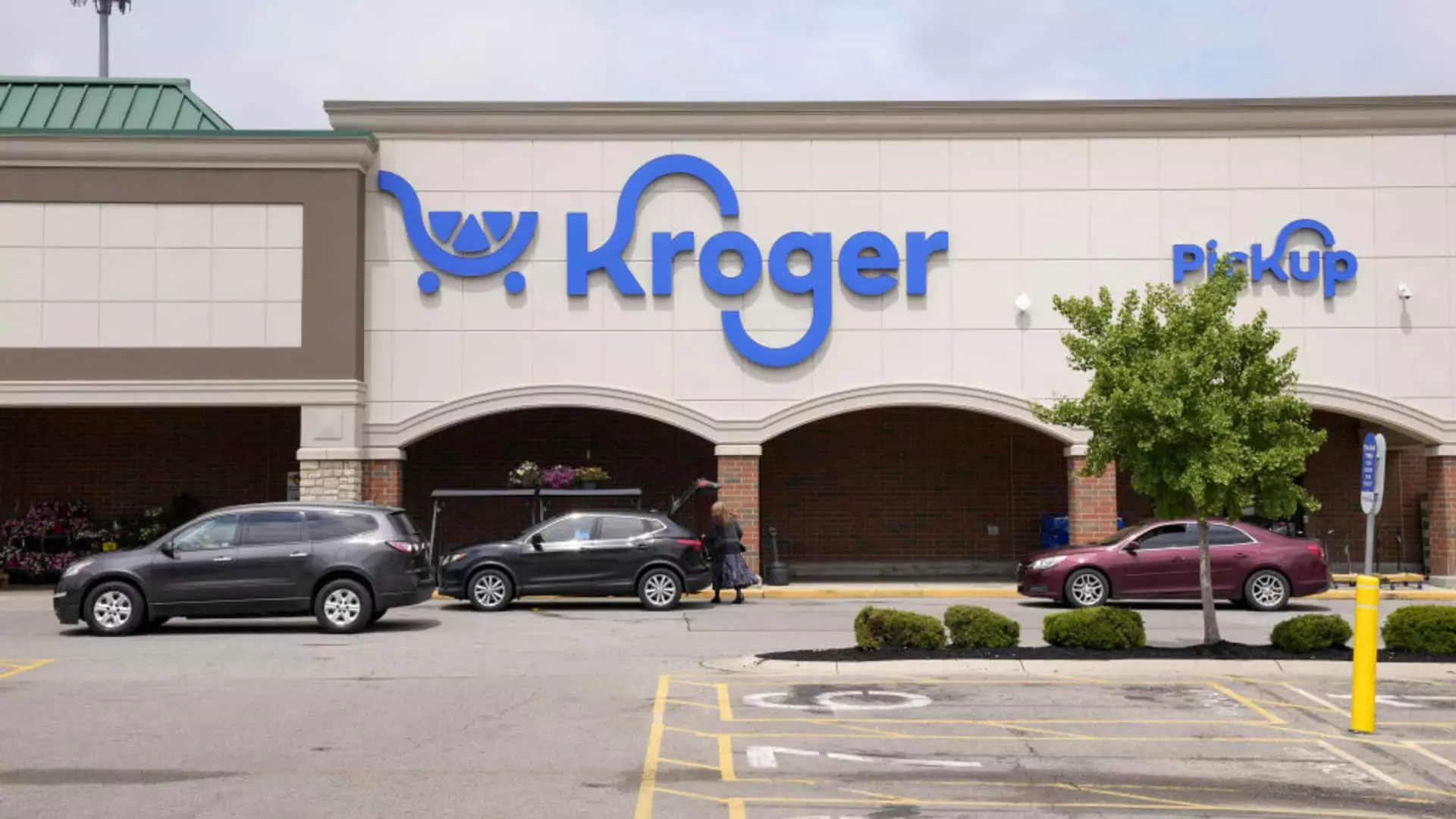Kroger, a giant in the grocery retail sector, has recently demonstrated both resilience and strategic agility amidst a rapidly shifting market landscape. In a significant move, the company announced a revised sales outlook, sending its shares soaring nearly 10%. This surge reflects not just financial optimism but a notable adaptation in customer behavior as shoppers gravitate towards cost-effective store brands and alternatives to dining out. While such a rally might seem sudden, it underscores a broader trend: consumers are evolutionarily adapting to economic pressures, drastically altering their shopping preferences in search of value.
Impressive Revenue Growth Amidst Competitors
Kroger’s financial performance in the first fiscal quarter presented a mixture of successes and challenges. With earnings per share surpassing analyst expectations, Kroger reported a net income of $866 million, revealing a commendable 3.2% increase in same-store sales when excluding fuel. Such growth came from varied sectors within the company, from pharmacy services to an impressive 15% year-over-year surge in e-commerce sales. This shift towards online shopping signifies not only a clear trend but a pivotal moment for Kroger as they navigate the competitive waters against juggernauts like Walmart and Costco.
It’s essential to recognize that while the S&P 500 grew merely 1% in a similar timeframe, Kroger’s performance — now boasting a nearly 16% increase in share value for the year — emphasizes the company’s unique positioning as a more affordable alternative for budget-conscious consumers amidst inflationary pressures. However, the real question remains: how sustainable is this growth in an environment rife with economic uncertainty?
Leadership Changes and Legal Challenges
Kroger faces considerable turbulence on the leadership front. The resignation of longtime CEO Rodney McMullen, coupled with the legal battles following the failed acquisition of Albertsons, presents an unsettling backdrop. These shifts, compounded by the newly installed CFO David Kennerley — previously of PepsiCo Europe — create an environment ripe for both challenges and opportunities. Amid these transitions, interim CEO Ron Sargent’s strategy to tailor Kroger’s offerings to value-conscious customers reflects a keen awareness of the evolving shopper mindset.
The ongoing legal entanglements stemming from the acquisition attempt raises questions about Kroger’s long-term strategy. Yet, Sargent’s focus on simplifying promotions and enhancing store-brand visibility may be exactly what Kroger needs to thrive amid heightened competition. Clarity and transparency with consumers could, in fact, enhance brand loyalty during these tumultuous times.
Innovating for the Future
Kroger’s pivot toward its private brands, which have now outpaced national competitors for seven consecutive quarters, is a testament to the company’s understanding of consumer desires. The introduction of 80 new protein-based products under the Simple Truth line indicates a proactive response to health trends that seem here to stay. Such initiatives not only reflect nimbleness but also invite active engagement with a customer base that increasingly seeks both value and health consciousness in their grocery selections.
Additionally, Kroger’s commitment to local sourcing for certain products offers strategic insulation from the full brunt of tariffs that plague most competitors reliant on imports. Sargent reassures investors and consumers that price stability is a priority. This commitment to local procurement illustrates Kroger’s deliberate strategy to remain relevant, adapting swiftly to the rise of value-oriented shopping behaviors.
Challenges in E-Commerce and Store Management
Despite these encouraging signs, Kroger’s e-commerce segment remains a sore spot, operating at a loss. The hybrid model of curbside pickup and home delivery is still under development and lacks profitability. It indicates a larger industry trend where the shift to e-commerce, while necessary, brings with it significant overhead costs and operational challenges. To combat this inefficiency, Kroger’s decision to close about 60 stores reveals a willingness to reorganize and modernize for sustainability.
While these closures may initially seem detrimental, they’re essential for reallocating resources more effectively towards growth markets. Seeking out higher-growth regions for new storefronts is a strategic move that could reinvigorate the brand and enhance overall profitability.
Kroger is navigating a complex tapestry of change, competition, and consumer expectations. As this supermarket giant braces for the future, it must concentrate on strengthening its core values around customer satisfaction, operational efficiency, and innovation. The grocery space is transforming, and those who adapt swiftly to its currents, like Kroger, may very well emerge as the next leaders in a highly competitive market.

